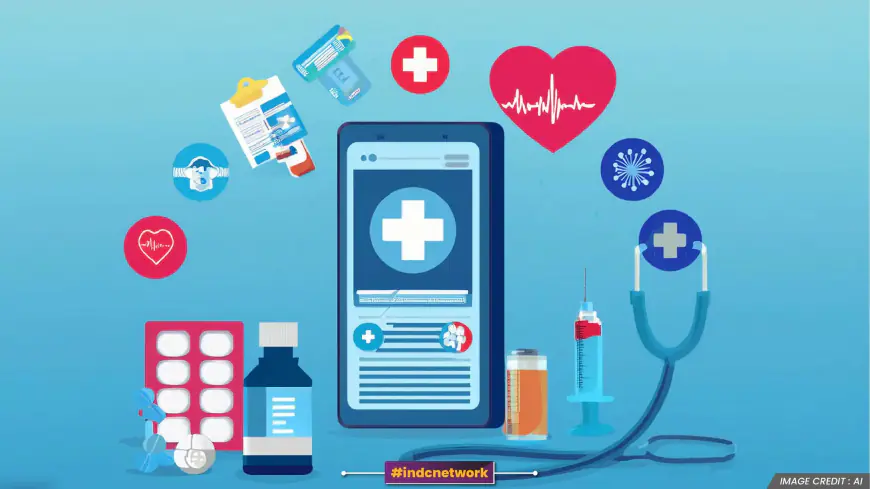Introduction : The rise of mobile technology has significantly transformed various industries, and healthcare is no exception. Mobile health apps, commonly referred to as mHealth apps, have emerged as powerful tools that empower patients, enhance healthcare delivery, and facilitate medical research. By providing accessible, user-friendly platforms for health monitoring, communication, and education, these applications are reshaping how patients engage with their health and how researchers gather data.
In this article, we will explore the multifaceted impact of mobile health apps on patient care and medical research. We will examine their role in improving patient engagement, enabling remote monitoring, and enhancing communication between patients and healthcare providers. Furthermore, we will discuss the implications of mobile health apps for medical research, including data collection, participant engagement, and real-time analytics. By analyzing the benefits and challenges associated with these technologies, we aim to highlight their transformative role in the healthcare ecosystem.
Understanding Mobile Health Apps
What are Mobile Health Apps? : Mobile health apps are software applications designed for smartphones, tablets, or other mobile devices that support health-related functions. These apps can assist users in managing their health, tracking fitness goals, monitoring chronic conditions, and accessing medical information. They often integrate with wearable devices, health sensors, and electronic health records (EHRs) to provide a comprehensive view of a user's health.
Key Features of Mobile Health Apps
-
Health Tracking: Many mobile health apps allow users to track various health metrics, such as physical activity, sleep patterns, heart rate, and dietary habits.
-
Medication Management: These apps can help users manage their medications by providing reminders, dosage instructions, and refill alerts.
-
Remote Monitoring: Mobile health apps enable healthcare providers to remotely monitor patients' health conditions, facilitating timely interventions when necessary.
-
Telemedicine Integration: Some apps facilitate virtual consultations with healthcare providers, allowing patients to receive care without visiting a physical location.
-
Patient Education: Mobile health apps often include educational resources, such as articles, videos, and tutorials, to empower patients with knowledge about their health conditions.
The Impact of Mobile Health Apps on Patient Care
1. Improved Patient Engagement : One of the most significant impacts of mobile health apps is the enhancement of patient engagement. These applications empower patients to take an active role in managing their health, leading to improved health outcomes.
- Access to Information: Mobile health apps provide patients with easy access to their health information, enabling them to understand their conditions better and make informed decisions about their care.
- Behavioral Change Support: Many apps offer features that encourage users to adopt healthier behaviors, such as tracking physical activity, promoting healthy eating, and providing motivational reminders. This support can lead to improved adherence to treatment plans.
2. Enhanced Communication Between Patients and Providers : Mobile health apps facilitate better communication between patients and healthcare providers, fostering collaborative relationships.
- Direct Messaging: Many apps include secure messaging features that allow patients to communicate with their healthcare providers, ask questions, and seek clarification about their treatment plans.
- Appointment Management: Mobile health apps enable patients to schedule appointments, receive reminders, and manage their healthcare visits more efficiently. This reduces no-show rates and improves care continuity.
3. Remote Monitoring and Chronic Disease Management : Mobile health apps are particularly beneficial for patients with chronic conditions, enabling remote monitoring and proactive management of their health.
- Real-Time Data Collection: Apps that integrate with wearable devices allow for continuous monitoring of vital signs, such as heart rate and blood glucose levels. This real-time data can help healthcare providers identify potential issues before they escalate.
- Personalized Care Plans: By collecting data on patients' daily activities and health metrics, mobile health apps can generate personalized care plans that adapt to users' needs, improving treatment adherence and overall health.
4. Increased Accessibility to Healthcare : Mobile health apps enhance accessibility to healthcare services, particularly for underserved populations.
- Geographical Barriers: Patients in remote or rural areas can access healthcare resources and support through mobile health apps, overcoming geographical barriers that may limit their access to care.
- Cost-Effectiveness: Many mobile health apps are free or low-cost, making healthcare services more affordable for patients who may not have access to traditional healthcare resources.
5. Enhanced Patient Satisfaction : The convenience and accessibility provided by mobile health apps contribute to higher patient satisfaction levels.
- User-Friendly Interfaces: Many mobile health apps are designed with user-friendly interfaces, making it easy for patients to navigate and access the information they need.
- Empowered Patients: By actively engaging in their healthcare management, patients feel more empowered and satisfied with their care experience.
The Impact of Mobile Health Apps on Medical Research
1. Data Collection and Analysis : Mobile health apps are transforming the way researchers collect and analyze health data, enabling more efficient and comprehensive studies.
- Real-Time Data Capture: Mobile health apps facilitate real-time data collection from participants, providing researchers with valuable insights into health behaviors, treatment outcomes, and disease progression.
- Diverse Data Sources: By incorporating data from various sources, including wearables, surveys, and EHRs, researchers can gain a more holistic understanding of health trends and patterns.
2. Participant Engagement and Recruitment : Mobile health apps offer innovative ways to engage and recruit research participants, addressing some of the challenges faced in traditional research methods.
- Increased Accessibility: Mobile health apps can reach a broader audience, allowing researchers to engage with participants who may have previously been difficult to reach through traditional methods.
- Streamlined Recruitment: Researchers can use mobile health apps to facilitate the recruitment process by providing potential participants with information about ongoing studies and enabling easy enrollment through the app.
3. Real-Time Analytics and Insights : The integration of mobile health apps with advanced analytics tools allows researchers to gain real-time insights into health data.
- Data Visualization: Mobile health apps can provide visual representations of health data, enabling researchers to quickly identify trends and patterns in participant responses.
- Adaptive Trials: Mobile health apps enable researchers to implement adaptive trial designs, allowing for adjustments to study protocols based on real-time data analysis, leading to more efficient research processes.
4. Longitudinal Studies and Patient-Centric Research : Mobile health apps facilitate longitudinal studies, enabling researchers to track health outcomes over time.
- Continuous Monitoring: Mobile health apps allow researchers to collect data from participants over extended periods, providing insights into the long-term effects of treatments and interventions.
- Patient-Centric Approaches: By incorporating patient feedback and preferences into research design, mobile health apps can help researchers align their studies with the needs and experiences of patients.
5. Collaboration and Data Sharing : Mobile health apps promote collaboration among researchers, healthcare providers, and participants, fostering a more integrated approach to medical research.
- Collaborative Platforms: Some mobile health apps serve as collaborative platforms that allow researchers to share data and findings, enhancing knowledge dissemination and fostering innovation.
- Ethical Data Sharing: By utilizing secure data-sharing protocols, mobile health apps can facilitate ethical data sharing among researchers while ensuring participant confidentiality.
Challenges and Considerations
While mobile health apps offer numerous benefits, there are also challenges and considerations that must be addressed to maximize their impact on patient care and medical research.
1. Data Privacy and Security : Ensuring the privacy and security of health data is paramount, particularly given the sensitive nature of medical information.
- Regulatory Compliance: Mobile health app developers must comply with regulations such as HIPAA (Health Insurance Portability and Accountability Act) to protect patient data and maintain confidentiality.
- User Trust: Building trust with users is crucial for the success of mobile health apps. Developers must implement robust security measures and communicate their data protection practices clearly to users.
2. User Engagement and Adoption : Achieving high user engagement and adoption rates can be challenging, particularly in a crowded app market.
- Simplicity and Usability: Mobile health apps must prioritize simplicity and usability to encourage user adoption. Complex interfaces or cumbersome processes can deter users from utilizing the app's features.
- Education and Awareness: Educating users about the benefits of mobile health apps and how to use them effectively is essential for driving engagement.
3. Integration with Existing Healthcare Systems : Integrating mobile health apps with existing healthcare systems and electronic health records (EHRs) can be a complex process.
- Interoperability: Ensuring that mobile health apps can seamlessly exchange data with existing healthcare systems is critical for enhancing care coordination and improving patient outcomes.
- Technical Challenges: Technical barriers, such as differing data formats and communication protocols, can hinder the integration process.
4. Variability in Research Quality : As mobile health apps enable more studies to be conducted, variability in research quality may become a concern.
- Standardization: Establishing standards for data collection, analysis, and reporting in mobile health research is essential to ensure the reliability and validity of findings.
- Participant Bias: Researchers must be aware of potential participant biases in mobile health studies, as users of these apps may differ significantly from the general population.
5. Sustainability and Funding : Ensuring the sustainability of mobile health apps can be a challenge, particularly for startups and smaller developers.
- Funding Opportunities: Securing funding for mobile health app development and maintenance is critical to ensuring the longevity of these solutions.
- Business Models: Developers must explore diverse business models, such as subscription-based pricing or partnerships with healthcare organizations, to sustain their applications.
Conclusion : Mobile health apps have had a profound impact on patient care and medical research, revolutionizing how healthcare is delivered and how data is collected. By enhancing patient engagement, facilitating remote monitoring, and improving communication between patients and providers, these apps empower individuals to take control of their health while enabling researchers to gather valuable insights.
As mobile health apps continue to evolve, it is essential to address the challenges associated with data privacy, user engagement, and integration with existing healthcare systems. By prioritizing these considerations, stakeholders can maximize the benefits of mobile health apps and further enhance their role in transforming the healthcare landscape.
In the coming years, as technology continues to advance, we can expect mobile health apps to play an even more significant role in shaping patient care and medical research, ultimately leading to improved health outcomes and more efficient healthcare delivery systems.















































































































































































